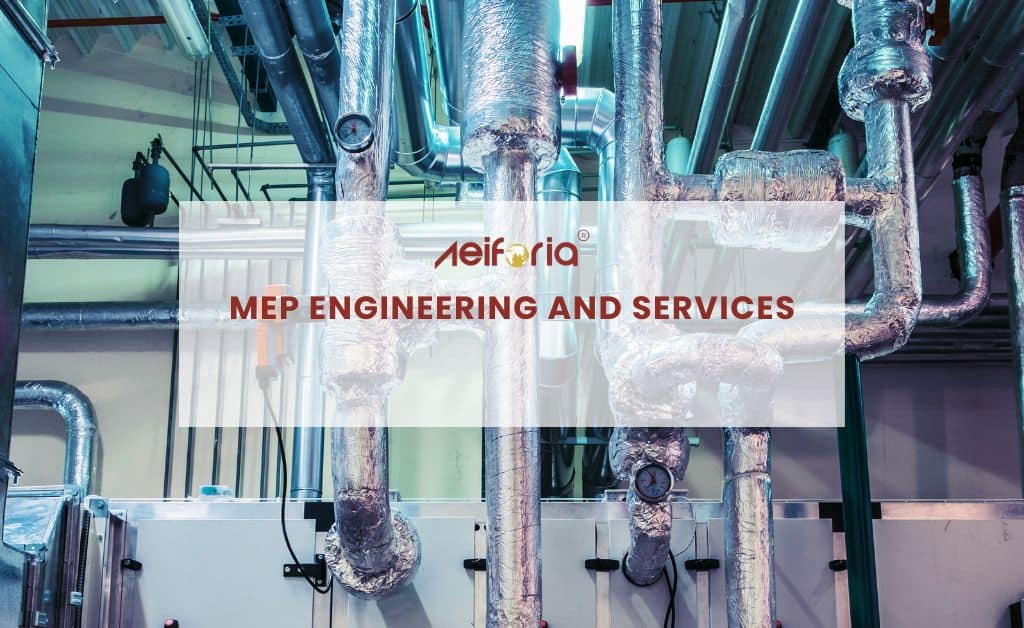
MEP Engineering and Services
MEP engineering plays a crucial role in the design and construction of buildings. The acronym stands for Mechanical, Electrical, and Plumbing Engineering and encompasses various services related to these systems. MEP engineers are responsible for ensuring that buildings are safe, functional, and energy-efficient by designing and overseeing the installation of mechanical systems, electrical wiring and lighting, and plumbing and water supply systems. In this blog post, we'll look at what MEP services involves and why it is vital to modern building design.
What is MEP Engineering Services: Mechanical, Electrical, and Plumbing
MEP engineering services involve installing, designing, and maintaining mechanical, electrical, and plumbing systems to ensure comfortable and safe building spaces for the occupants. It integrates different engineering disciplines to ensure that buildings are functional, efficient, and sustainable. Without MEP engineering, buildings would lack proper ventilation, lighting, heating, and cooling, making them uncomfortable and even hazardous.
MEP Components
MEP engineering covers three central mechanical, electrical, and plumbing components. Let's examine each of these systems more closely:
Mechanical
Mechanical systems refer to the heating, ventilation, and air conditioning (HVAC) systems in a building. These systems regulate the temperature and air quality in a building, provide hot water, and control humidity levels.
MEP engineers work to design and optimize these systems to ensure that they are energy-efficient, cost-effective, and provide optimal indoor air quality and temperature control.
Electrical
Electrical systems refer to the electrical wiring and components in a building. These systems provide power to lighting, appliances, and other electrical devices.
MEP engineers work to design and optimize these systems to ensure that they are safe, reliable, and efficient. This includes designing the electrical distribution system, selecting the appropriate components, and ensuring the system meets all safety codes and regulations.
Plumbing
Plumbing systems refer to the water supply and drainage systems in a building. These systems provide clean water for drinking, washing, and other uses, removing wastewater and other waste products.
MEP engineers work to design and optimize these systems to ensure that they are safe, reliable, and efficient. This includes designing the plumbing distribution system, selecting the appropriate components, and ensuring the system meets all safety codes and regulations.
Benefits of MEP Engineering Services
There are several benefits to using MEP engineering services in construction projects. Here are some of the key advantages:
Enhanced Energy Efficiency
MEP engineering plays a significant role in improving the energy efficiency of a building. Using energy-efficient technologies, MEP engineers can reduce energy consumption and lower the building's overall energy expenses. They achieve this by designing and implementing systems that maximize energy efficiency, such as HVAC (heating, ventilation, and air conditioning) systems, lighting systems, and energy-efficient water heating systems.
Improved Indoor Air Quality
MEP engineering is also essential in improving the indoor air quality of a building. MEP engineers design systems that ensure proper ventilation, air filtration, and humidity control, which help to eliminate harmful pollutants, reduce allergens, and improve overall air quality.
Increased Comfort
A comfortable environment is essential for the well-being of building occupants. MEP engineers design and implement systems that regulate temperature, humidity, and air quality, providing occupants with a comfortable and healthy living or working environment.
Cost Savings
Efficient energy use, waste reduction, and improved building systems can result in significant cost savings for building owners. MEP engineering can minimize the cost of building operations, maintenance, and repairs and improve the overall value of the building.
Better Control of Building Systems
MEP engineering enables building owners and operators to have better control over their building systems. They can monitor and control the HVAC, lighting, and plumbing systems remotely, allowing them to make real-time adjustments to optimize system performance.
Increased Lifespan of Building Systems
Proper design and implementation of MEP systems can increase the lifespan of building systems. By ensuring the systems are installed and maintained correctly, building owners can avoid costly repairs and replacements and extend the lifespan of their building systems.
Compliance with Building Codes and Regulations
MEP engineering is critical to ensuring compliance with building codes and regulations. MEP engineers are responsible for designing and implementing systems that meet safety codes and regulations, ensuring the safety of building occupants and minimizing potential liability issues.
Integration with Other Systems
MEP engineering is closely integrated with other building systems, such as fire protection, security, and building automation. MEP engineers work with other building professionals to ensure seamless integration of all systems, ensuring they work together efficiently.
Improved Safety and Security
MEP systems can also improve safety and security in buildings. Fire protection systems, for example, can alert occupants to potential fires, and smoke control systems can contain and control smoke in the event of a fire.
Reduced Maintenance Costs
Proper design and implementation of MEP systems can reduce maintenance costs. Building owners can avoid costly repairs and replacements by installing the systems correctly, resulting in significant cost savings over time.
Environmental Benefits
MEP engineering also has environmental benefits. By incorporating energy-efficient technologies and sustainable design practices, MEP engineers can help reduce buildings' environmental impact. This includes reducing carbon emissions, minimizing water consumption, and reducing waste.
MEP Engineering Applications
MEP engineering is a crucial component of designing, constructing, and maintaining many different types of buildings. Here are some examples of how MEP engineering is used in different kinds of buildings:
Commercial Buildings
Buildings used for commercial purposes, such as offices, retail stores, and restaurants, require MEP engineering services to ensure they are functional and comfortable for occupants. Here are some of the most prevalent uses of MEP engineering in commercial buildings:
Heating, Ventilation and Air Conditioning (HVAC) Systems
HVAC systems are essential for maintaining a comfortable temperature and good air quality within commercial buildings. MEP engineers are responsible for designing and installing HVAC systems that meet the unique needs of each building. This includes selecting the appropriate equipment, designing ductwork and ventilation systems, and ensuring the system meets local building codes and regulations.
Electrical Systems
MEP engineers are also responsible for designing and installing electrical systems in commercial buildings. This includes designing lighting systems, selecting electrical equipment, and ensuring the approach is safe and reliable.
Plumbing Systems
Plumbing systems are another critical component of commercial buildings. MEP engineers design and install plumbing systems that provide clean water and efficient waste removal. This includes designing piping systems, selecting plumbing fixtures, and ensuring the system meets local building codes and regulations.
Industrial Buildings
Industrial buildings, such as factories, warehouses, and manufacturing facilities, have unique MEP engineering requirements that differ from those of commercial and residential buildings. The following are a few of the most common applications of MEP engineering in industrial buildings:
Lighting Systems
Industrial buildings require lighting systems designed to meet the facility's specific needs. MEP engineers are responsible for designing energy-efficient lighting systems that provide adequate illumination for workers.
Fire Protection Systems
Industrial buildings often require specialized fire protection systems to ensure workers' safety and equipment and materials' protection. MEP engineers design and install fire suppression systems, including sprinklers and alarms, that are tailored to the facility's needs.
Energy Management Systems
Industrial buildings typically require large amounts of energy to power machinery and equipment. MEP engineers design and install energy management systems that help reduce energy consumption and increase efficiency.
Residential Buildings
Residential buildings, such as houses and apartment complexes, also require MEP engineering services to ensure they are safe and comfortable for occupants. Below are a few of the common uses of MEP engineering in residential buildings:
Electrical and Lighting Systems
MEP engineers design and install electrical and lighting systems that meet the needs of residential buildings. This includes selecting the appropriate electrical equipment and designing lighting systems that provide adequate illumination.
Plumbing Systems
Plumbing systems are critical for providing clean water and efficient waste removal in residential buildings. MEP engineers design and install plumbing systems that meet local building codes and regulations.
HVAC Systems
HVAC systems are essential for maintaining a comfortable temperature and good air quality within residential buildings. MEP engineers design and install HVAC systems that meet the unique needs of each building, including selecting the appropriate equipment and designing ductwork and ventilation systems.
How Can MEP Engineers Help in Construction?
MEP (Mechanical, Electrical, and Plumbing) engineers are critical in construction projects. They are responsible for designing, installing, and maintaining buildings' mechanical, electrical, and plumbing systems. These systems include heating and cooling, ventilation, electrical power and lighting, fire protection, and plumbing.
MEP engineers work closely with architects, structural engineers, and contractors to ensure the building's systems are correctly designed and installed. They must also comply with local building codes and regulations.
During construction, MEP engineers help ensure the building's systems are installed correctly and operate efficiently. They also work to resolve any issues that may arise during construction.
After the construction, MEP engineers continue to play a role in the building's maintenance and operation. They are responsible for regular inspections, maintenance, and repairs to ensure the building's systems operate efficiently.
How To Choose the Right MEP Engineering Firm?
Expertise and Experience
One of the most important factors to consider while choosing an MEP engineering firm is its expertise and experience. Look for a firm that specializes in your specific type of project. For example, suppose you are building a high-rise office building. In that case, you will want a firm with experience designing and implementing MEP systems in high-rise buildings. Additionally, consider the firm's expertise in your particular industry.
Quality of Work
The quality of work provided by an MEP engineering firm is crucial to the success of your project. Look for a firm that has a track record of delivering high-quality work. You can gauge the quality of a firm's work by reviewing its portfolio of completed projects. Look for projects that are similar to yours in scope and complexity. Additionally, ask the firm for references from previous clients and follow up with those references to get an idea of the firm's work quality and reliability.
Reputation and References
The reputation of an MEP engineering firm is also essential when making your decision. Look for a firm with a solid reputation in the industry. You can research the firm's reputation online by reading reviews and ratings on platforms such as Google My Business and Yelp. Additionally, ask the firm for references from previous clients and follow up with those references to get an idea of the firm's reputation and reliability.
Project Management Skills
Efficient project management is necessary to ensure any construction project's success. When choosing an MEP engineering firm, look for a firm with solid project management skills. Consider how the firm manages its projects, including communication and collaboration with other project team members. Look for a firm that uses project management software to ensure that projects stay on schedule and within budget.
Communication and Collaboration
Clear communication and effective collaboration between the MEP engineering firm and the other project team members are essential to your project's success. Look for a firm that has a reputation for effective communication and collaboration. Consider how the firm communicates with its clients and collaborates with other project team members. Look for a firm that is responsive to your needs and proactively communicates with you throughout the project.
Aeiforia is the ideal choice for anyone looking for MEP engineering services. With a team of experienced engineers, excellent customer service, strong project management skills, and a focus on sustainability, Aeiforia delivers high-quality solutions that meet each client's unique needs.
Choosing Aeiforia means working with experts committed to providing tailored MEP cost-effective, energy-efficient, and sustainable solutions. The company's customer service team is always available to answer any questions or concerns, ensuring a smooth and stress-free project experience. Contact Aeiforia today to learn more about their MEP engineering services and how they can help you with your project.
FAQs
Why is MEP engineering important in building design?
MEP engineering is essential in building design because it ensures the occupants' safety, comfort, and efficiency.
What skills are required for MEP engineering?
Skills required for MEP engineering include technical knowledge of mechanical, electrical, and plumbing systems, problem-solving, communication, and project management skills.
What distinguishes MEP engineering from HVAC engineering?
MEP engineering covers mechanical, electrical, and plumbing systems, while HVAC engineering focuses on heating, ventilation, and air conditioning systems.
What is the difference between MEP engineering and structural engineering?
MEP engineering focuses on buildings' mechanical, electrical, and plumbing systems. In contrast, structural engineering focuses on designing and analyzing the building's structural elements.
What are the common challenges faced by MEP engineers?
Some common challenges MEP engineers face include complex system designs, strict building codes and regulations, tight project schedules, and coordination with other design disciplines.






